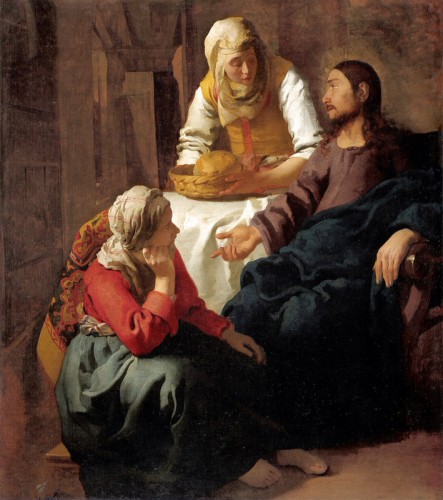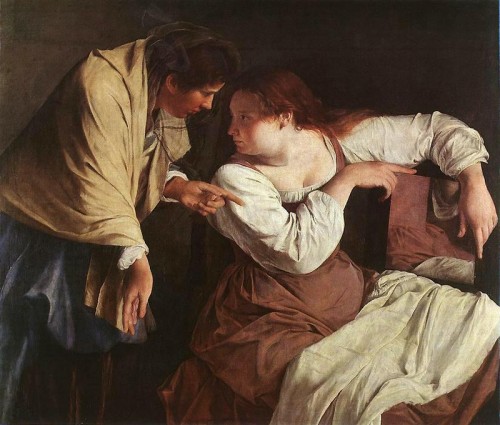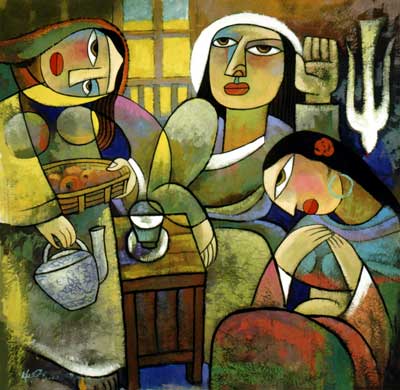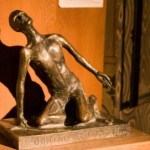 Briefly, Luke tells the familiar vignette of Martha and Mary. Jesus and his friends have come to their house. Martha is bustling around the kitchen, wanting to offer her best to them. But Mary is sitting in the parlor with the men, drinking in the wisdom Jesus is spilling before them. And Martha complains. To Jesus. Why does he not push Mary to get into the kitchen and help her? Martha is indignant. And querulous. She wants to be in charge of her sister. And she has assumed the right to decide for them both, what ‘they’ should do, what hospitality is, and whose role is what in that.
Briefly, Luke tells the familiar vignette of Martha and Mary. Jesus and his friends have come to their house. Martha is bustling around the kitchen, wanting to offer her best to them. But Mary is sitting in the parlor with the men, drinking in the wisdom Jesus is spilling before them. And Martha complains. To Jesus. Why does he not push Mary to get into the kitchen and help her? Martha is indignant. And querulous. She wants to be in charge of her sister. And she has assumed the right to decide for them both, what ‘they’ should do, what hospitality is, and whose role is what in that.
I’ve known women named Martha who hate their names because of this story, because Martha complains and because Jesus reproaches her, and because that reproach has been mercilously misconstrued and applied to women everywhere. Martha, you are bossy. And, Martha, you belong in the kitchen, are the ways in which it is misconstrued. But Jesus did not say those things.
I’ve known, through their writings, theologians who hate this tale, seeing it as one more biblical slam against women. Biblical literature has a deep gender bias, and often women are omitted from stories where, on a second reading, anyone can see they were there and central. Or, their names are omitted, and an important tale is told about a nameless woman (the woman at the well is one; the woman stoned for adultery is another; the woman who anoints Jesus’ feet is a third). So it is harsh, indeed, to have a story where two women are named, and one of them is reproached.
I’ve even read theological arguments saying Jesus should have required everyone present to help in the kitchen, keeping the conversation till the work was done. And in today’s world, that would be good advice. But in first century Jerusalem, it was not acceptable for men to enter an unrelated woman’s kitchen, nor for any guest to take over the organization of a household from its owner. Martha and Mary are distinctive, in part, because they did own a home, they were women of some means, and competent at managing their lives. They supported Jesus in his work, and were also his close friends. So they were far more than domestics. His community of friends would have known that.
 I think Jesus’ advice here is entirely consistent with his responses in other situations where anyone tries to bring him or another into line through angry querulousness. Whether in friend or stranger, Jesus treats this kind of spirit as the kind that needs to be reined in, not the kind that needs to be supported. Objectors, fault-finders, arguers, all get short shrift from Jesus, who is looking for the spirit of fascinated imagination, not the spirit of bustling busy worker bees.
I think Jesus’ advice here is entirely consistent with his responses in other situations where anyone tries to bring him or another into line through angry querulousness. Whether in friend or stranger, Jesus treats this kind of spirit as the kind that needs to be reined in, not the kind that needs to be supported. Objectors, fault-finders, arguers, all get short shrift from Jesus, who is looking for the spirit of fascinated imagination, not the spirit of bustling busy worker bees.
Even more, Jesus supports women, here in Martha and Mary’s home, and at the well, and in the house where his feet are anointed. He supports the right of women to choose for themselves what they are called to do, and with whom.
This is a central Pro-Choice tale. And in the centuries’ old argument over women needing to be told what to do or women making their own decisions, Jesus is consistently Pro-Choice. Mary has chosen the good portion, and it will not be taken away from her, he says, of the sister who has stepped away from traditional life, and from the kitchen, and chosen to become a disciple. And he says of the prostitute who has anointed his feet, She has loved deeply, and will be rewarded in heaven for her love. He says this to his indignant host, who is outraged at her temerity.
The forces that prefer to keep women pregnant and submissive (whether they are kept without the vote or higher education or birth control or abortion) are out of step with Jesus, who always, always, sides with women making independent choices, choices that free them to follow a destiny that lies beyond their immediate circumstances.
 The forces that would keep women adhering to a public model of womanhood wrap themselves in a cloak of religiosity. Yet Jesus, time after time, stands with women who are being objected to as unrighteous. He encourages them (at the well, where he tenderly persuades a diffident woman to drink from his cup), defends them (the woman who anoints his feet and the woman being stoned for adultery), and praises them (Mary, in this story) as women who make wise choices.
The forces that would keep women adhering to a public model of womanhood wrap themselves in a cloak of religiosity. Yet Jesus, time after time, stands with women who are being objected to as unrighteous. He encourages them (at the well, where he tenderly persuades a diffident woman to drink from his cup), defends them (the woman who anoints his feet and the woman being stoned for adultery), and praises them (Mary, in this story) as women who make wise choices.
I believe it is for this reason that Luke and Matthew include this tale in their gospels, and especially because it shows that a woman was a disciple; and not because it is a story about Martha fussing.
I do know many women who have been fussed at by women like Martha. Churches are rife with women muttering against women who (a) are single mothers (b) don’t rush to marry or don’t stay married (c) don’t want to work on fairs or rummage sales (d) do take challenging social positions, and (e) get ordained. That women like Mary remain in the church is a marvel. They do so because of Jesus, their Defender and their Friend.
A week or so ago, a Texan named Wendy Davis, a single mother and a state representative, stood up to filibuster, for twelve hours or more, in protest against quasi-religious repressive legislation limiting Texas women’s right to make choices about their own fertility and child-bearing. Would that the churches of America were bolder in proclaiming the advocacy of Jesus for women’s choice-making. But in every age, from Ann Hutchinson to Wendy Davis, churches have been blind to women, and deaf to Jesus’ speaking up for women making their own choices, especially when others disagree. In Jesus’ name, then, Amen to Wendy Davis. She has learned from the Master and chosen the good portion, and it will not be denied to her.
_____________________________________________________
Illustrations:
1. Martha and Mary with Jesus, by Johann Vermeer von Delftt, 1654, National Gallery of Scotland. Vanderbilt Divinity School Library, Art in the Christian Tradition.
2. Mary-Martha, by Orazio Gentileschi, Munich, Germany, 1620. Vanderbilt Divinity School Library, Art in the Christian Tradition.
3. Jesus at the Home of Martha and Mary, by He Qi, China, 2001
Vanderbilt Divinity School Library, Art in the Christian Tradition.











